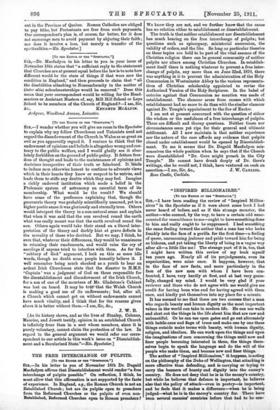[To THE EDITOR OF TEE "SPECTATOR.")
Sin,—I wonder whether you will give me room in the Spectator to explain why my fellow Churchmen and Unionists need not regard the disendowment of the Church in Wales as so great an evil as you apparently regard it. I venture to think that the endowment of opinions and beliefs is altogether wrong and con- trary to the public welfare, and I would gladly see it abso- lutely forbidden on the ground of public policy. It fetters free- dom of thought and leads to the maintenance of opinions and doctrines irrespective of their truth or falsehood. It tends to induce men otherwise honest to continue to advocate views which in their hearts they know or suspect to be untrue, and leads them to stifle any doubts which they may feel. Imagine a richly endowed institution which made a belief in the Ptolemaic system of astronomy an essential term of its membership. What would be the result ? We should have some of the professors explaining that, though the geocentric theory was probably scientifically unsound, yet in a higher poetic sense it was gloriously and eternally true. Others would interpret the theory in a non-natural sense and explain that when it was said that the sun revolved round the earth what was really meant was that the earth revolved round the sun. Others again would take their stand on a literal inter- pretation of the theory and darkly hint at grave defects in the morality of those who doubted. But we may, I think, be sure that, whatever their differences, they would be unanimous in retaining their emoluments, and would raise the cry of sacrilege if anyone tried to interfere with them. As for the "robbery of God" argument, I look on this as mere idle words, though no doubt some people honestly believe it. I well remember being much shocked as a youth to hear an ardent Irish Churchman state that the disaster to H.M.S. ' Captain' was a judgment of God on those responsible for the disestablishment and disendowment of the Irish Church, for a son of one of the members of Mr. Gladstone's Cabinet was lost on board. It may be true that the Welsh Church is making a good use of its endowments ; but, after all, a Church which cannot get on without endowments cannot have much vitality, and I think that for the reasons given above it is better without them.—I am, Sir, &c.,
J. W. B.
[As its history shows, and as the lives of Stanley, Colenso, Maurice, and Jowett testify, opinion in an established Church is infinitely freer than in a sect whose members, since it is purely voluntary, cannot claim the protection of the law. In regard to the general argument we would refer our corre- spondent to our article in this week's issue on " Disestablish- ment and a Secularized State."—En. Spectator.]


















































 Previous page
Previous page